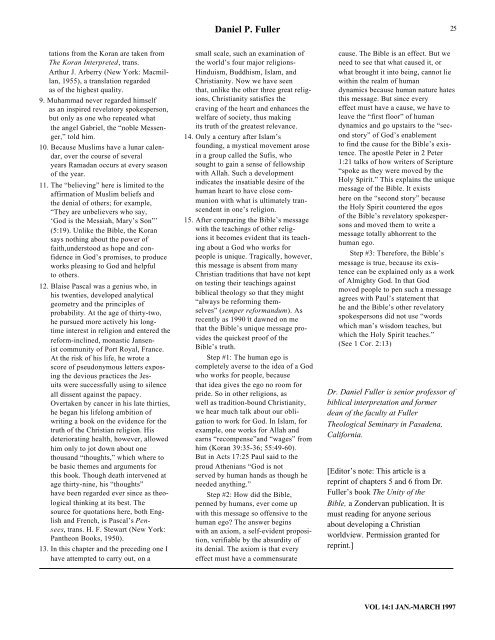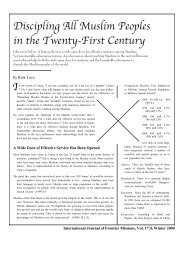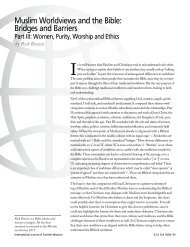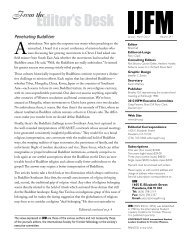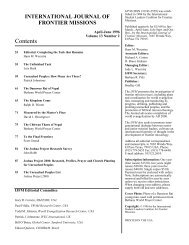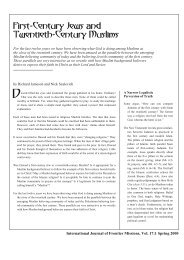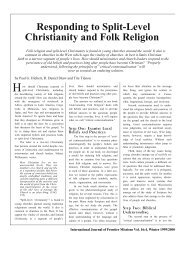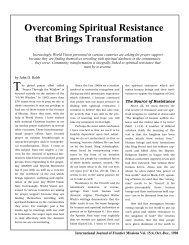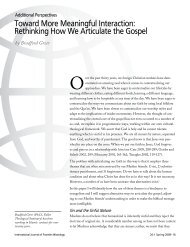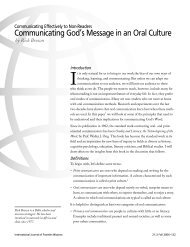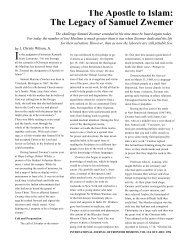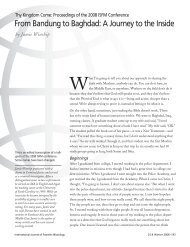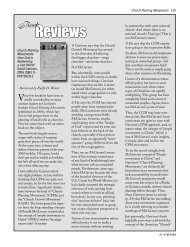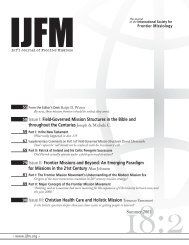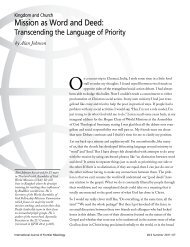24One’s <strong>Future</strong> <strong>in</strong> H<strong>in</strong>duism, <strong>Buddhism</strong> <strong>and</strong> <strong>Islam</strong>strength, <strong>and</strong> character necessary to meetsome need of Allah the employer. Soit would be <strong>in</strong>congruous <strong>in</strong> this system toconsider fellowship with such a deficientGod as a reward for one’s praiseworth<strong>in</strong>ess <strong>in</strong> meet<strong>in</strong>g his needs.Precisely at this po<strong>in</strong>t the uniquenessof the God of the Bible becomes mostevident, for he “is not served by humanh<strong>and</strong>s as if he needed anyth<strong>in</strong>g” (Acts17:25). To the contrary, the God of theBible works on behalf of, or for thebenefit of, those who trust <strong>and</strong> hope <strong>in</strong>him. And he is so complete <strong>in</strong> himselfthat <strong>in</strong> thus work<strong>in</strong>g he f<strong>in</strong>ds his greatestjoy. As Old Testament theologianWalther Eichrodt observed, Israel’s religionwas the direct opposite of thosepracticed by the surround<strong>in</strong>g peoples. Intheir religions god was the client forwhom the people must work <strong>in</strong> order toget from him certa<strong>in</strong> bless<strong>in</strong>gsregarded as wages— someth<strong>in</strong>g earned.But for Israel it was just the reverse:Israel was to regard itself as the client forwhom God was work<strong>in</strong>g, as long asthe people trust<strong>in</strong>gly obeyed his directivesfor their welfare.The situation <strong>in</strong> <strong>Islam</strong> is exactlyreverse of Christianity. In the Christianfaith God is the praiseworthy workerwho meets the needs of believ<strong>in</strong>g people,then hav<strong>in</strong>g fellowship with such agood God becomes most desirable.We thus can conclude that <strong>Islam</strong>, <strong>in</strong> comparisonwith Christianity, promises aheaven that falls far short of be<strong>in</strong>g whatthe human heart craves for most.No Assurance <strong>in</strong> <strong>Islam</strong>This second drawback is madeclear by the Koran, which teaches that it isonly the pan-balances at the futurejudgment that will determ<strong>in</strong>e those Muslimswho will be saved. In the meantimeone can only hope that his or hergood works will outweigh the evil.But no one can be sure, <strong>and</strong> this fear offailure tends to keep one somewhatnervous about the future <strong>and</strong> to that extentunconcerned about the needs of others.Thus the very lack of assurancereduces a person’s potential for be<strong>in</strong>glov<strong>in</strong>g. Also the less benevolent one is toothers, the fewer good works will be<strong>in</strong> the pan-balance to counteract the evilones. This situation <strong>in</strong> <strong>Islam</strong>, <strong>and</strong>even <strong>in</strong> some branches of Christianity(i.e., Roman Catholicism) can easilycreate a vicious circle, where the lack ofassurance of be<strong>in</strong>g God’s child keepsuncerta<strong>in</strong>ty reign<strong>in</strong>g <strong>in</strong> the heart, which <strong>in</strong>turn lessens one’s chances for do<strong>in</strong>ggood works. And the more people realizethat this fear is keep<strong>in</strong>g them fromlook<strong>in</strong>g for opportunities to be benevolent,the more they lack assurancethat God will be pleased with them.Here then, is a strik<strong>in</strong>g contrastbetween <strong>Islam</strong> <strong>and</strong> the religion of theBible. Hebrews 6:11-12 says, “Wewant each of you to prove the same diligenceas before <strong>in</strong> ma<strong>in</strong>ta<strong>in</strong><strong>in</strong>g fullassurance of hope unto the end of yourlives, <strong>in</strong> order that... you may be imitatorsof those who through faith <strong>and</strong>patience <strong>in</strong>herit the promises”(author’s own translation). The Biblemakes full confidence that God is forus <strong>and</strong> not aga<strong>in</strong>st us which is the foundationon which to build a life of goodworks. In contrast, <strong>Islam</strong> teaches that onemust try to amass as many goodworks as possible without any such assurance,s<strong>in</strong>ce only at the f<strong>in</strong>al judgmentcan it be known whether one is tospend eternity <strong>in</strong> paradise or <strong>in</strong> hell.These two major drawbacks <strong>in</strong> <strong>Islam</strong>underscore the superior value of thereligion taught <strong>in</strong> the Bible, as do the difficulties<strong>in</strong>herent <strong>in</strong> H<strong>in</strong>duism <strong>and</strong><strong>Buddhism</strong>. We therefore conclude, thatthe Bible sets forth a message wellworth our while expend<strong>in</strong>g the time <strong>and</strong>energy to underst<strong>and</strong>. Only by appropriat<strong>in</strong>gits message will the God-shapedvacuum of the heart be satisfied,completely <strong>and</strong> forever. 15Review Questions on <strong>Islam</strong>1. In what sense is Allah merciful,even though paradise is reserved onlyfor those whose good deeds outweigh thebad?2. What is the most significant omission<strong>in</strong> the Muslim description of paradise(heaven) <strong>in</strong> contrast to the Christi<strong>and</strong>escription of heaven?3. Who is the client <strong>in</strong> <strong>Islam</strong>, God orthe Muslim? Who is the client <strong>in</strong> biblicalreligion, God or the believer?4. When should one ga<strong>in</strong> fullassurance of s<strong>in</strong>s forgiven <strong>in</strong> Christianity?When is it ga<strong>in</strong>ed <strong>in</strong> <strong>Islam</strong>?5. Expla<strong>in</strong> why the Christian doctr<strong>in</strong>eof assurance helps one to be morebenevolent than does the Muslim doctr<strong>in</strong>e.Notes1. The Bhagavad Gita, trans. ShriPurohit Swami (London: Faber &Faber, 1978). This song is part ofthe Mahabharata, a 100,000-verse epiccomposed 400 B.C.-A.D. 400.Accord<strong>in</strong>g to John B. Noss, scholarsestimate that the Bhagavad Gitawas composed around A.D. 100(Man’s Religions, 3d ed. [NewYork: Macmillan, 1963], 266).2. Ajith Fern<strong>and</strong>o, The Christian’sAttitude Toward World Religions(Wheaton, Ill.: Tyndale House,1987), 43. The author is a native of SriLanka.3. The <strong>in</strong>formation regard<strong>in</strong>g <strong>Buddhism</strong>for this summary comes fromNoss, Man’s Religions, 167-252, <strong>and</strong>from A Buddhist Bible, ed. DwightGoddard (New York: E. F. Dutton,1952).4. Noss, Man’s Religions, 180.5. Ibid., 217.6. Edward Conze, <strong>Buddhism</strong>: Its Essence<strong>and</strong> Development (NewYork: Harper & Row, 1959), 128.7. Noss, Man’s Religions, 221, cit<strong>in</strong>gSir Charles Eliot, H<strong>in</strong>duism <strong>and</strong> <strong>Buddhism</strong>,3 vols. (London: EdwardArnold, 1921), 2:30. The quotation isfrom the Lesser Sukhavati-vyuha.8. The 114 suras, or chapters, <strong>in</strong> theKoran (“Read<strong>in</strong>g”) are arrangednot chronologically but generally bylength (e.g., the second is 15 percentof the whole Koran; the last oneconsists of only seven l<strong>in</strong>es). Quo-INTERNATIONAL JOURNAL OF FRONTIER MISSIONS
Daniel P. Fuller25tations from the Koran are taken fromThe Koran Interpreted, trans.Arthur J. Arberry (New York: Macmillan,1955), a translation regardedas of the highest quality.9. Muhammad never regarded himselfas an <strong>in</strong>spired revelatory spokesperson,but only as one who repeated whatthe angel Gabriel, the “noble Messenger,”told him.10. Because Muslims have a lunar calendar,over the course of severalyears Ramadan occurs at every seasonof the year.11. The “believ<strong>in</strong>g” here is limited to theaffirmation of Muslim beliefs <strong>and</strong>the denial of others; for example,“They are unbelievers who say,‘God is the Messiah, Mary’s Son”’(5:19). Unlike the Bible, the Koransays noth<strong>in</strong>g about the power offaith,understood as hope <strong>and</strong> confidence<strong>in</strong> God’s promises, to produceworks pleas<strong>in</strong>g to God <strong>and</strong> helpfulto others.12. Blaise Pascal was a genius who, <strong>in</strong>his twenties, developed analyticalgeometry <strong>and</strong> the pr<strong>in</strong>ciples ofprobability. At the age of thirty-two,he pursued more actively his longtime<strong>in</strong>terest <strong>in</strong> religion <strong>and</strong> entered thereform-<strong>in</strong>cl<strong>in</strong>ed, monastic Jansenistcommunity of Port Royal, France.At the risk of his life, he wrote ascore of pseudonymous letters expos<strong>in</strong>gthe devious practices the Jesuitswere successfully us<strong>in</strong>g to silenceall dissent aga<strong>in</strong>st the papacy.Overtaken by cancer <strong>in</strong> his late thirties,he began his lifelong ambition ofwrit<strong>in</strong>g a book on the evidence for thetruth of the Christian religion. Hisdeteriorat<strong>in</strong>g health, however, allowedhim only to jot down about onethous<strong>and</strong> “thoughts,” which where tobe basic themes <strong>and</strong> arguments forthis book. Though death <strong>in</strong>tervened atage thirty-n<strong>in</strong>e, his “thoughts”have been regarded ever s<strong>in</strong>ce as theologicalth<strong>in</strong>k<strong>in</strong>g at its best. Thesource for quotations here, both English<strong>and</strong> French, is Pascal’s Pensees,trans. H. F. Stewart (New York:Pantheon Books, 1950).13. In this chapter <strong>and</strong> the preced<strong>in</strong>g one Ihave attempted to carry out, on asmall scale, such an exam<strong>in</strong>ation ofthe world’s four major religions-H<strong>in</strong>duism, <strong>Buddhism</strong>, <strong>Islam</strong>, <strong>and</strong>Christianity. Now we have seenthat, unlike the other three great religions,Christianity satisfies thecrav<strong>in</strong>g of the heart <strong>and</strong> enhances thewelfare of society, thus mak<strong>in</strong>gits truth of the greatest relevance.14. Only a century after <strong>Islam</strong>’sfound<strong>in</strong>g, a mystical movement arose<strong>in</strong> a group called the Sufis, whosought to ga<strong>in</strong> a sense of fellowshipwith Allah. Such a development<strong>in</strong>dicates the <strong>in</strong>satiable desire of thehuman heart to have close communionwith what is ultimately transcendent<strong>in</strong> one’s religion.15. After compar<strong>in</strong>g the Bible’s messagewith the teach<strong>in</strong>gs of other religionsit becomes evident that its teach<strong>in</strong>gabout a God who works forpeople is unique. Tragically, however,this message is absent from manyChristian traditions that have not kepton test<strong>in</strong>g their teach<strong>in</strong>gs aga<strong>in</strong>stbiblical theology so that they might“always be reform<strong>in</strong>g themselves”(semper reform<strong>and</strong>um). Asrecently as 1990 it dawned on methat the Bible’s unique message providesthe quickest proof of theBible’s truth.Step #1: The human ego iscompletely averse to the idea of a Godwho works for people, becausethat idea gives the ego no room forpride. So <strong>in</strong> other religions, aswell as tradition-bound Christianity,we hear much talk about our obligationto work for God. In <strong>Islam</strong>, forexample, one works for Allah <strong>and</strong>earns “recompense”<strong>and</strong> “wages” fromhim (Koran 39:35-36; 55:49-60).But <strong>in</strong> Acts 17:25 Paul said to theproud Athenians “God is notserved by human h<strong>and</strong>s as though heneeded anyth<strong>in</strong>g.”Step #2: How did the Bible,penned by humans, ever come upwith this message so offensive to thehuman ego? The answer beg<strong>in</strong>swith an axiom, a self-evident proposition,verifiable by the absurdity ofits denial. The axiom is that everyeffect must have a commensuratecause. The Bible is an effect. But weneed to see that what caused it, orwhat brought it <strong>in</strong>to be<strong>in</strong>g, cannot liewith<strong>in</strong> the realm of hum<strong>and</strong>ynamics because human nature hatesthis message. But s<strong>in</strong>ce everyeffect must have a cause, we have toleave the “first floor” of hum<strong>and</strong>ynamics <strong>and</strong> go upstairs to the “secondstory” of God’s enablementto f<strong>in</strong>d the cause for the Bible’s existence.The apostle Peter <strong>in</strong> 2 Peter1:21 talks of how writers of Scripture“spoke as they were moved by theHoly Spirit.” This expla<strong>in</strong>s the uniquemessage of the Bible. It existshere on the “second story” becausethe Holy Spirit countered the egosof the Bible’s revelatory spokespersons<strong>and</strong> moved them to write amessage totally abhorrent to thehuman ego.Step #3: Therefore, the Bible’smessage is true, because its existencecan be expla<strong>in</strong>ed only as a workof Almighty God. In that Godmoved people to pen such a messageagrees with Paul’s statement thathe <strong>and</strong> the Bible’s other revelatoryspokespersons did not use “wordswhich man’s wisdom teaches, butwhich the Holy Spirit teaches.”(See 1 Cor. 2:13)Dr. Daniel Fuller is senior professor ofbiblical <strong>in</strong>terpretation <strong>and</strong> formerdean of the faculty at FullerTheological Sem<strong>in</strong>ary <strong>in</strong> Pasadena,California.[Editor’s note: This article is arepr<strong>in</strong>t of chapters 5 <strong>and</strong> 6 from Dr.Fuller’s book The Unity of theBible, a Zondervan publication. It ismust read<strong>in</strong>g for anyone seriousabout develop<strong>in</strong>g a Christianworldview. Permission granted forrepr<strong>in</strong>t.]VOL 14:1 JAN.-MARCH 1997


